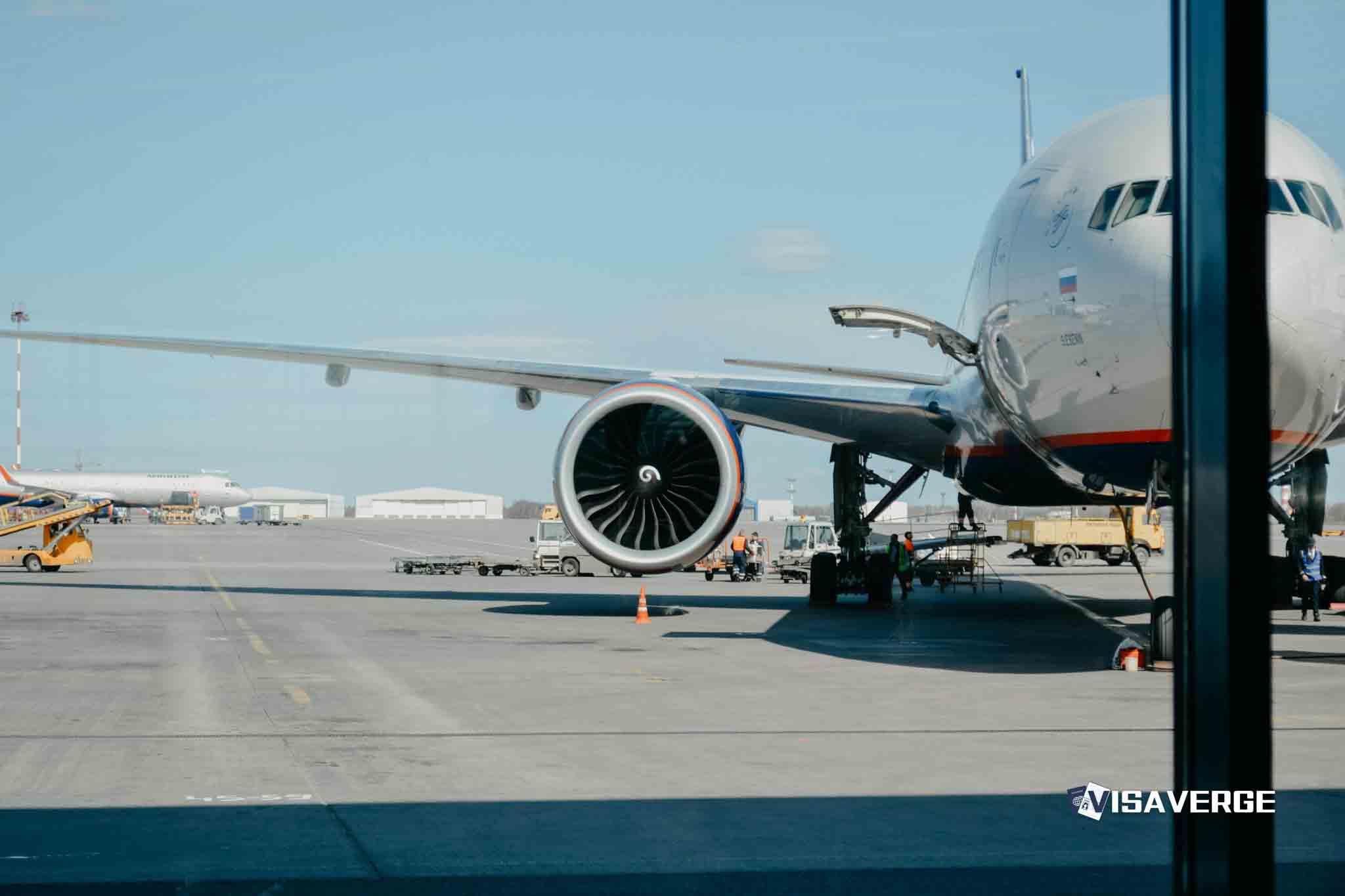Key Takeaways
• EU’s new visa suspension targets Israel, Russia, Georgia, Maldives for human rights and law violations.
• Israel faces visa-free travel loss amid war crime allegations; airlines suspend flights to Israel.
• New EU rules fully implemented by July 2025, complicating travel for affected countries’ citizens.
Europe’s Visa Cancellations and Diplomatic Shifts: New Travel Crises for Israel, Russia, Georgia, and the Maldives
Europe 🇪🇺 is facing a wave of visa cancellations, travel disruptions, and diplomatic shifts that are affecting travelers and governments in Israel, Russia 🇷🇺, Georgia, and the Maldives 🇲🇻. These changes, which have unfolded rapidly in June 2025, are creating new challenges for tourists, business travelers, airlines, and entire economies. Here’s a detailed look at what’s happening, why it matters, and what travelers and stakeholders need to know.

What’s Happening: The Big Picture
In June 2025, the European Union (EU) introduced a new visa suspension mechanism. This policy makes it much easier for the EU to cancel or suspend visa-free travel agreements with other countries. The move comes amid growing concerns about human rights, international law, and security. As a result, travelers from Israel, Russia, Georgia, and the Maldives are facing new visa requirements, canceled flights, and uncertain travel plans.
Key points:
– The EU’s new visa suspension rules target countries accused of breaking international law or human rights standards.
– Israel is at high risk of losing its visa-free travel status due to allegations of war crimes in Gaza.
– Georgia’s visa-free regime is under threat because of concerns about democracy and rule of law.
– Russia and the Maldives are also facing visa cancellations and increased scrutiny.
– Airlines have suspended or canceled flights to Israel, causing major travel disruptions.
Why Did Europe Make These Changes?
The EU’s decision to reform its visa suspension mechanism is rooted in a desire to enforce international standards. The new rules allow the EU to suspend visa-free travel for countries that:
– Violate the United Nations Charter
– Commit serious human rights abuses
– Ignore decisions from international courts
This is a shift from the EU’s previous approach, which mostly used economic sanctions. Now, the EU is using travel and mobility as tools to pressure countries to follow international rules.
According to analysis by VisaVerge.com, this new approach marks a significant change in how Europe 🇪🇺 handles diplomatic disagreements and human rights concerns.
Who Is Affected by Europe’s Visa Cancellations?
Israel 🇮🇱
Israel is facing the most immediate risk. The United Nations has accused Israel of war crimes and crimes against humanity in its military actions in Gaza. As a result, the EU is considering suspending Israel’s visa-free travel status. If this happens, Israeli citizens will need to apply for visas before visiting Europe 🇪🇺, making travel for tourism, business, and family visits much more complicated.
Georgia
Georgia has enjoyed visa-free travel to the EU since 2017. However, EU lawmakers are now debating whether to suspend this privilege. The main concerns are about Georgia’s commitment to democracy and the rule of law. If the EU moves forward, Georgian travelers will face new visa requirements and possible delays.
Russia 🇷🇺
Russia has been under EU sanctions and travel restrictions since its conflict with Ukraine began. The new visa suspension mechanism gives the EU more power to tighten these restrictions further. Russian travelers are already facing increased visa scrutiny and cancellations.
Maldives 🇲🇻
The Maldives, a popular tourist destination, is also facing visa cancellations. The EU is concerned about governance and compliance with international standards. While details are less public, travelers from the Maldives may find it harder to visit Europe 🇪🇺 in the coming months.
How Are Airlines Responding?
The situation has become even more complicated due to the outbreak of conflict between Israel and Iran on June 13, 2025. This has led to widespread airline suspensions and flight cancellations to and from Israel.
Major developments:
– United Airlines evacuated its staff from Israel and has no flights available until at least July.
– Delta Air Lines has canceled all flights to Tel Aviv through September 1, 2025.
– Lufthansa, Air France, KLM, Ryanair, and Wizz Air have all suspended or delayed flights to Israel and nearby airports.
– Emirates, Etihad, and Qatar Airways have suspended or rerouted flights to avoid Israeli airspace.
– Air India canceled all flights between Delhi and Tel Aviv through June.
These changes have left thousands of travelers stranded or forced to find alternative routes, often at higher costs and with long delays.
The EU’s New Visa Suspension Mechanism: What Changed?
The EU’s visa suspension mechanism is not new, but it has been reformed to make it easier to use. In the past, the EU only used this tool once, against Vanuatu, because of its citizenship-by-investment program that allowed wealthy Russians to buy passports. Now, the rules are broader and can be applied to any country that:
– Breaks the UN Charter
– Commits serious human rights abuses
– Fails to follow international court rulings
The reform was agreed upon by EU lawmakers and member states in mid-June 2025. It is expected to be fully implemented by July 2025.
Slovenian MEP Matjaž Nemec, who led the bill, said the new rules are meant to enforce human rights and international law, not to target specific countries. However, Israel and Serbia are seen as the most likely to be affected soon.
For more details on the EU’s visa policies and the new suspension mechanism, travelers can visit the European Commission’s Migration and Home Affairs page.
What Does This Mean for Travelers?
Israeli Travelers
If the EU suspends visa-free travel for Israel, Israeli citizens will need to:
– Apply for a Schengen visa before traveling to Europe 🇪🇺
– Provide documents such as proof of accommodation, travel insurance, and financial means
– Wait for visa processing, which can take several weeks
This will make spontaneous trips and last-minute travel much harder. Business travelers and families with relatives in Europe 🇪🇺 will face new hurdles.
Georgian Travelers
Georgians may soon lose their visa-free access to the EU. If this happens, they will need to apply for visas, attend interviews, and provide supporting documents. This could affect students, workers, and tourists.
Russian and Maldivian Travelers
Travelers from Russia 🇷🇺 and the Maldives 🇲🇻 are already facing increased scrutiny. Visa applications may be delayed or denied, and travel plans may be disrupted with little notice.
Tourists and Business Travelers
Anyone planning to visit Europe 🇪🇺 from these countries should:
– Check the latest visa requirements on official EU embassy or consulate websites
– Apply for visas as early as possible
– Monitor airline websites for flight updates and cancellations
– Consider alternative routes if direct flights are suspended
Step-by-Step Guide for Affected Travelers
- Check Visa Status: Visit the official EU embassy or consulate website for your country to see if visa-free travel is still allowed.
- Apply for a Schengen Visa: If required, fill out the Schengen visa application form and gather all necessary documents.
- Book Appointments: Schedule a visa interview at the nearest EU consulate or visa center.
- Monitor Airline Announcements: Check your airline’s website for the latest information on flight schedules and cancellations.
- Plan Alternative Routes: If direct flights are canceled, look for connecting flights through other countries or airports.
- Stay Updated: Follow official announcements from the EU, your government, and airlines, as rules can change quickly.
The Impact on Tourism and Business
The tourism industries in Israel, Georgia, and the Maldives are expected to suffer major losses. Airlines have canceled thousands of seats, and travelers are facing uncertainty about when flights will resume. Hotels, tour operators, and local businesses that depend on international visitors are already feeling the effects.
Business travelers are also affected. Meetings, conferences, and trade events may be postponed or moved online. Companies that rely on easy travel between Europe 🇪🇺 and these countries will need to adjust their plans.
Diplomatic and Political Implications
The EU’s new visa suspension rules are not just about travel—they are also a diplomatic tool. By making it harder for citizens of certain countries to visit Europe 🇪🇺, the EU hopes to pressure governments to follow international law and respect human rights.
Some experts warn that suspending Israel’s visa-free status could make diplomatic tensions worse and further isolate the country. Others believe that these measures are necessary to uphold international standards.
For Georgia, the threat of losing visa-free travel is a sign that the EU is losing patience with countries that do not meet its expectations for democracy and the rule of law.
Russia 🇷🇺 and the Maldives 🇲🇻 may face ongoing restrictions depending on how they respond to EU demands.
Historical Context: How Did We Get Here?
The EU’s visa-free travel agreements are part of its efforts to build closer ties with neighboring countries. These agreements are meant to encourage tourism, business, and cultural exchange. However, they come with conditions. Countries must respect human rights, follow international law, and maintain good governance.
Visa suspensions have been rare. The only previous case was Vanuatu in 2023, when the EU suspended visa-free travel because of concerns about its passport program.
The current wave of visa cancellations and travel disruptions shows that the EU is now willing to use travel restrictions as a way to enforce its values.
What’s Next? The Road Ahead
Looking forward, the EU is expected to fully implement the new visa suspension mechanism by July 2025. This means that visa-free travel for Israel and Georgia could be suspended very soon.
Airlines may start to resume flights to Israel after September 2025 if the security situation improves. However, there is still a lot of uncertainty.
Diplomatic talks between the EU and affected countries are likely to intensify. Governments will try to negotiate solutions to restore travel and avoid further isolation.
Travelers and tourism businesses should be prepared for ongoing changes. Visa requirements, flight schedules, and travel routes may continue to shift throughout the rest of 2025.
Practical Advice for Stakeholders
For Travelers:
– Always check the latest visa requirements before booking travel.
– Apply for visas as early as possible to avoid delays.
– Keep in touch with airlines for updates on flights and rebooking options.
– Have backup plans in case of sudden changes.
For Airlines and Travel Companies:
– Communicate clearly with customers about cancellations and alternative options.
– Work closely with governments and airports to adjust schedules as needed.
– Prepare for increased demand on alternative routes.
For Governments:
– Engage in diplomatic talks to resolve issues and restore travel.
– Provide clear information to citizens about new requirements and procedures.
– Support affected industries, especially tourism and hospitality.
Where to Find Official Information
For the most reliable and up-to-date information, travelers and stakeholders should use official sources:
– European Commission – Migration and Home Affairs: Updates on visa policies and suspension mechanisms.
– EU embassies and consulates: For country-specific visa application procedures.
– Airlines’ official websites: For flight schedules, cancellations, and rebooking.
– United Nations reports: For background on human rights allegations influencing EU decisions.
Conclusion: A Time of Uncertainty and Change
Europe’s visa cancellations, travel disruptions, and diplomatic shifts are creating a new era of uncertainty for travelers from Israel, Russia 🇷🇺, Georgia, and the Maldives 🇲🇻. The EU’s new visa suspension mechanism is a powerful tool that links travel to international law and human rights. While the goal is to promote better behavior by governments, the immediate impact is being felt by ordinary travelers, airlines, and businesses.
As reported by VisaVerge.com, the situation is changing quickly, and those affected should stay informed, plan ahead, and be ready to adapt. The coming months will be critical as the EU finalizes its new rules and countries respond to the challenges ahead. For now, careful planning and attention to official updates are the best ways to manage the risks and uncertainties of travel in 2025.
Learn Today
Visa Suspension Mechanism
→ EU policy allowing cancellation or suspension of visa-free travel agreements with specified countries.
Visa-Free Travel → Permission allowing citizens to enter another country without obtaining a visa beforehand.
Schengen Visa → A visa allowing travel within the Schengen Area of European countries under specific conditions.
International Courts → Judicial bodies deciding on violations of international law and human rights issues.
Human Rights Abuses → Serious violations of fundamental rights and freedoms recognized internationally.
This Article in a Nutshell
Europe’s visa suspensions affect Israel, Russia, Georgia, and Maldives due to human rights concerns. New EU policies complicate travel and cancel flights. Airlines react with suspensions amid Israeli-Iran conflict. Travelers need visas and updated info as diplomatic tensions impact tourism, business, and international mobility throughout 2025.
— By VisaVerge.com













